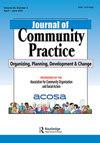在COVID-19大流行的最初几个月里,互助的概念是如何扩散的?批判现象学分析
IF 1.2
Q2 SOCIAL WORK
引用次数: 2
摘要
互助是社会边缘群体长期以来的做法,在2019冠状病毒病大流行和危机加剧的背景下,互助已成为一种广泛存在的集体关怀形式。我们使用批判性现象学方法来了解在COVID-19大流行的最初几个月参与互助的参与者(N = 25)如何将互助概念化,以及他们的社会身份如何与他们的概念化交叉。我们发现,互助的概念落在一个范围内;一些参与者(主要是拥有特权社会身份的人)认为互助是一种暂时的危机应对措施,与传统援助类似,可以作为政府支持的辅助手段。其他人(倾向于拥有更边缘化的社会身份)认为互助是一种持续的支持机制,与传统的援助明显不同,应该与政府结构分开。我们的研究提供了在复杂危机时刻的互助和很少研究的互助增加的见解。我们邀请互助会考虑他们对自己工作的理解如何落在这个范围内,并为互助会工作中的政治教育提供资源。本文章由计算机程序翻译,如有差异,请以英文原文为准。
How was mutual aid being conceptualized during its proliferation in the early months of the COVID-19 pandemic? A critical phenomenological analysis
ABSTRACT Mutual aid, a longstanding practice among socially marginalized communities, has proliferated as a widespread form of collective care amidst the COVID-19 pandemic and compounding crises. We used critical phenomenological methods to understand how participants (N = 25) who engaged in mutual aid in the early months of the COVID-19 pandemic conceptualized mutual aid, and how their social identities intersect with their conceptualizations. We found that conceptualizations of mutual aid fell upon a spectrum; some participants (who primarily held privileged social identities) saw mutual aid as a temporary crisis response, which was similar to traditional aid, and could be adjunctive to government support. Others (who tended to hold more marginalized social identities) saw mutual aid as an ongoing support mechanism which was explicitly different than traditional aid and should be separate from government structures. Our research offers insight into mutual aid at a moment of compounding crises and little studied increase in mutual aid. We invite mutual aid groups to consider how their understandings of their work fall upon this spectrum and offer resources for political education in mutual aid work.
求助全文
通过发布文献求助,成功后即可免费获取论文全文。
去求助
来源期刊

Journal of Community Practice
SOCIAL WORK-
CiteScore
2.40
自引率
18.20%
发文量
27
期刊介绍:
The Journal of Community Practice is an interdisciplinary journal grounded in social work. It is designed to provide a forum for community practice, including community organizing, planning, social administration, organizational development, community development, and social change. The journal contributes to the advancement of knowledge related to numerous disciplines, including social work and the social sciences, urban planning, social and economic development, community organizing, policy analysis, urban and rural sociology, community health, public administration, and nonprofit management. As a forum for authors and a resource for readers, this journal makes an invaluable contribution to the community"s conceptualization, applications, and practice.
 求助内容:
求助内容: 应助结果提醒方式:
应助结果提醒方式:


